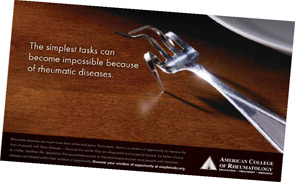“When we make a Capitol Hill visit and we have five minutes with someone, it can be disheartening to spend four of the five minutes talking about who we are and what we do,” Latimer says. “The Capitol Hill component of Simple Tasks aims to help with this, giving our members and their patients more time to talk about the legislative priorities of the organization.” A focus group conducted in late 2010 and consisting of eight influencers helped to identify what kind of education is needed to avoid this kind of learning curve, she adds.
“Part of the campaign is to heighten the understanding about the frequency and impact of these diseases,” says ACR Communications and Marketing Committee Chair Eric Matteson, MD, chair of rheumatology at Mayo Clinic in Rochester, Minn. Influencing the influencers could make a difference in affordable medications, reimbursement, and rheumatology-related research, he says.

Beyond Capitol Hill
The campaign also aims to raise the awareness of rheumatology among patient care advocacy groups and nonrheumatologist physicians. Research for the campaign found that physicians often have a misconception of what rheumatology does, or may not have much awareness of the specialty at all. For example, there are cases of family practitioners treating rheumatoid arthritis, while such a practice would not be considered acceptable if the patient had lung cancer, Dr. Ruderman says.
Another example is someone with musculoskeletal complications being referred to an orthopedist. Although that person may need an orthopedist or related surgery at some point in their care, they would usually do best starting with a rheumatologist, Dr. Ruderman says.
For these reasons, the Simple Tasks campaign points out the special knowledge and care that rheumatologists provide as well as the importance of early and appropriate treatment by a rheumatologist.
Physician and advocacy groups the campaign will target include the American Academy of Family Physicians, American Academy of Pediatrics, and the American College of Physicians. Campaign leaders hope the campaign’s audience garners an awareness of rheumatic diseases along the lines of the awareness for breast cancer, prostate cancer, diabetes, and hypertension—all important health conditions but ones where some may have an exaggerated sense of their risk. Those conditions tend to have more resources devoted toward them; some rheumatic diseases have just as high a risk of occurring as some of these more well-known diseases, but fewer resources and research, Dr. Matteson says.
Supporting Materials
A number of focus groups and surveys were used to determine what materials would be used in the campaign, Latimer says.